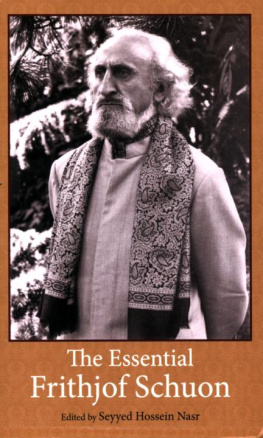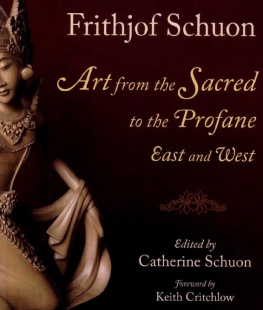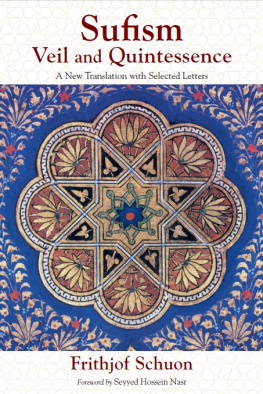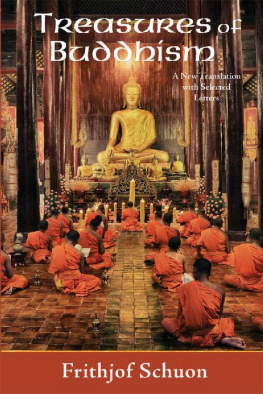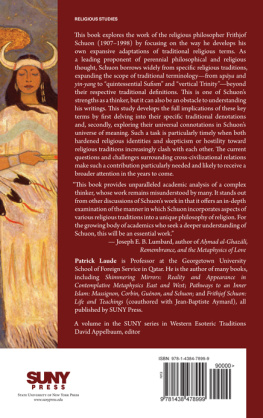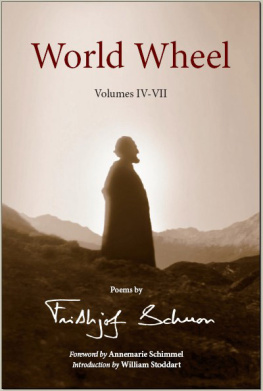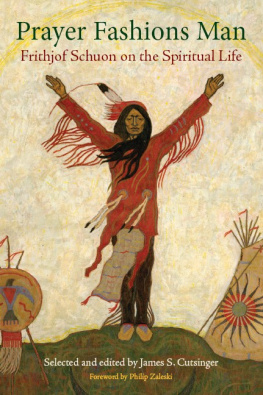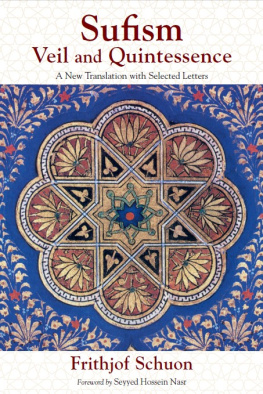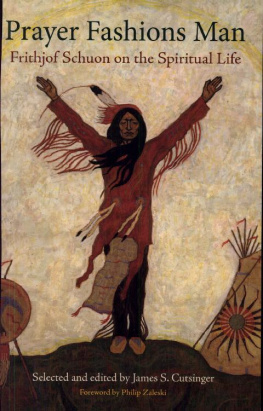APPENDIX
Selections from Letters and Other Previously Unpublished Writings
1
The institution of every tradition is operated through the Word by means of a principle, which, in Christianity, is represented by Saint Peter: we refer here to the principle of the formal realization of the tradition, a principle of which, within the framework of Christianity, Saint Peter was the human expression. To this principle is related another, namely, that of the expansion of the tradition, a principle represented by Saint Paul, whose investiture took place by means of the following words: For this man is to me a vessel of election, to carry my name before the Gentiles and kings and the children of Israel (Acts 9:15); and also: Thou shalt be his witness to all men of those things which thou hast seen and heard (Acts 22:15). As for the Johannine principle, this links the Christian tradition to the universal and primordial tradition; that is why there is a certain antinomy between it and the two preceding principles, which are subordinated to it, and this relative antinomy is none other than that of form and spirit. This necessary, because inevitable, antinomy between John and Peter finds its expression in Christs reproach to Peter on the subject of John (John 21:22), a reproach which indicates that these are things which do not enter the domain of Peter.
2
Another pitfall is the problem of conversions. First of all, it is not true that the one who changes religion for valid motives, loses the benefit of what he has already obtained; on the contrary, this somethingthe ineffaceable sacraments for examplewill be turned to account within the framework of the new spiritual economy; and it is necessarily so because there is only one God, and because, precisely, the reasons for the change are valid; valid in the eyes of God before being valid in the eyes of men. I am thinking here of esoteric reasons, which exclude misinterpretation or contempt for the religion abandoned; the case is obviously different when there is conversion properly so called, for then the old religion is rejected and its ineffaceable traces, now incapable of being turned to account, are at least neutralized. All this has nothing to do with the question of knowing whether, yes or no, one has transcended the limits of individuality; there is no quasi-mixture of forms, since the formal elements of the old religion, as I have said, are in part neutralized and in part revalued, or either one or the other. If it were not so, no religion could ask for conversion; no conversion could be preached; the Islamic preaching and the conversion of millions of Christians, Hindus, Africans, and Malays, would be illegitimate. And when Christian missionaries preach in all the countries that they can reach, they do not ask if the structure of a given religionof Hinduism for example, with is various forms of initiation, its samskras and its dkshsrenders possible the conversion to Christianity, or if the candidates for baptism have reached the primordial state; from Antiquity onwards, Christians have baptized initiates of Eleusis, Samothrace, and elsewhere, without causing any difficulties. The Christian requirement is unconditional, and the same is true for every other expansive religion.
3
The question of Intercession derives from the eternal connections between the Principle and Manifestation; the body transpierced is an aspect of Manifestation in front of the Principle, but it is clearly not all of the aspects. The Taoist Yin-Yang is an adequate image of the relationship between the Absolute and the contingent, God and the world, or God and man: the white part is God, the black part is man; the black dot in the white part is man in Godprincipially pre-figured in Godor the relative in the Absolute, or the Word, which in fact prefigures man; the white dot in the black part is the human God, the God-Man, which refers to the mystery of immanence. The four words of the Shahdahand the two halves of this formula, Nafy and Ithbtlead to the same analysis.
On the one hand, the Principle alone is, Manifestation is not; on the other hand, Manifestation is real by the fact, precisely, that it manifests and thus prolongs the Principle. On the one hand, the Principle has the tendency to punish or to destroy Manifestation because it is not It, or because it seems to want to be It, or because It alone is; on the other hand, the Principle loves Manifestation and remembers that it is not other than It, and it is in this perspective that the mystery of Intercession inserts itself, and also that of the mystery of Redemption. But it is falsewhile being exoterically admissible, the religions being upyasto maintain that between the Principle and Manifestation there is only one single relationship, or that man is reduced to a single possibility.
Meister Eckhart wrote some extremely bold formulations about all of this: for example, the distinction between Godhead (= Beyond-Being) and God (= Being) is like the distinction between Heaven and earth; Vedantists say analogous things about tm and shvara, or Para-Brahma and Brahma or Apara-Brahma (= nirguna and saguna).
And these haqiq have to be emphasized when one writes as a metaphysician on the varied and complementary connections between God and the world; and on what other grounds could a metaphysician write about this if not by referring to the principial? For finally, if one is going to take the trouble to write, one must know why and for whom; one must kindle some light and seek to enlighten someone or other. And one must know on what grounds one stands.
4
Concentration in itself is not too difficult, but what is difficult is maintaining concentration in duration. I want to say that prayer has two extensions, one in space, and that is the easier one, and one in time, and that is the harder one; our existence is world and life. And the first extension of prayer is that we free ourselves inwardly from the world, from multiplicity; the second is that this inward liberation become habitual; just as the world must become a point, the center where we stand or where our prayer or the Divine Name stands, so must our life become an instant, the now of God, through which duration flows simultaneously. God knows that we are weak, and does not expect any miracle from us; but the little that we can do for the next world can be infinitely meaningful.
5
All indirectly or directly necessary sensory experiences or activities, be they physical or psychic, have so to speak a sacramental value and a corresponding effectiveness, at least in principle; in the case of primordial man as well as the enlightened sage it is actual; indeed this results from the nature of things. Meister Eckhart said that he who has grasped this mysterythat is to say, he who has fully realized itreceives the Eucharist each time upon eating or drinking; this indicates the sacredness of food and of eating and drinking; that is why there are peoples or tribes who remain reverentially silent while eating, and therein also lies the deeper significance of grace pronounced at mealtime. The same applies to other sensory experiences that are noble in themselves, and it applies above all to love; and then, also to gazing and hearing, for both can be either worldly or holy, exteriorizing or interiorizing. Sacredness of what is natural; sanctification of what is natural; healing through the natural; therein lies the spiritual nobleness of man. One can also say that this nobleness is reverential devotion; hence, the direct or indirect remembrance of God, dhikruLlh. Gratitude is connected to that because the noble man does not allow habituation to jade him, he always experiences the symbol and beauty anew, as upon the first day of the encounter; hence his soul does not age, it remains in timeless childhood and becomes ever truer to itself.


